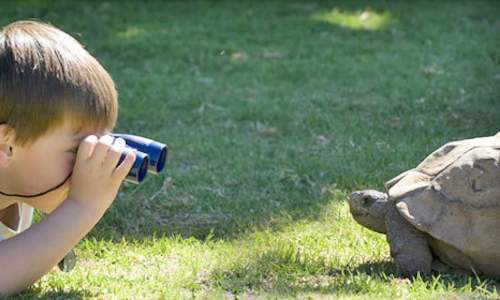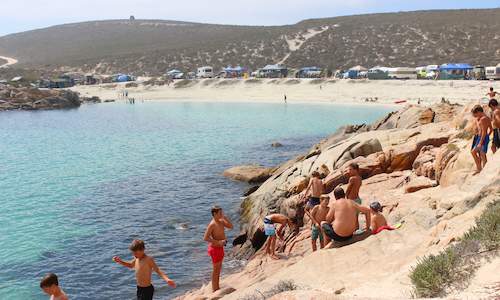
Learning About Nature
Recently there has been a lot of concern in some circles that the children of today are missing out on nature. They are so connected with their technology that when they are in the bush they become scared. Introduce your child to the wonders of nature.
Camping with young children can be a challenge and for this reason many parents wait until their children are older. Pitching the tent in the backyard may be fun, but nothing beats getting out there and introducing them to the wonders of nature.
What is the Right Age to Take Kids Camping?
One of the biggest factors to take into account when taking children camping is their age. If they are young it is probably better to stay in a resort near civilization rather than a very remote area. That way if there is an emergency you can get help quickly. Keep in mind your child's attention span and capabilities - you cannot expect a toddler to do gruelling hikes.
If you have small children, it's probably not a good idea to go camping for more than a few days, as the chances are good that they will get bored and the novelty will wear off. Once this happens, they will become irritable and things can go downhill from there and you'll have a disastrous camping holiday.
Words of Wisdom
Decide where to go and consider factors such as wild animals and Malaria. There are many fantastic malaria-free national parks and nature reserves in South Africa. Kruger also has many fenced campsites that are ideal for family camping holidays.
If you have an only child, consider inviting one of their friends along as two children are better able to keep themselves entertained than a child that is on its own. This will give you more time to relax.
For younger children, don't plan on travelling too far as long journeys tire them out and they will become irritable. Bear in mind that it will also take time to set up camp, so you need to arrive in time to pitch the tent in daylight. Trying to pitch a tent in the dark with complaining kids is an arduous task! If you do have to travel a long way, take frequent breaks where the children can get out and run around and let off some energy.
The kids will get dirty - make peace with the fact. Let them explore and get some dirt on their faces. You can pack the dirty clothing into a separate plastic bag to keep it separate from the clean clothing. If you are going on a camping trip of a few days, choose a campsite that has ablution facilities.
Planning
This is one of the most essential parts of the camping experience, especially with children. When you are away from all the standard amenities, planning for the unexpected and emergencies is very important. While adults can do without and get by children often cannot or will be very vocal in making their displeasure known.
- Pack a comforting item such as a teddy, blanket, mug etcetera - a little something of home that will comfort them and calm them down if they get scared.
- Packing is important. Remember to check what the weather is going to be like and pack accordingly. Always pack for both hot and cold weather as it can change quickly.
- Pack lots of snacks. All the running around in the open air is likely to give the children a good appetite.
- Pack extra clothing as the children are sure to get wet and dirty and will need a change of clothes.
- Pack hats, sunscreen, insect repellent and don't forget to pack water bottles and most importantly - the toilet paper!
- Pack a basic first aid kit and check that none of the medicines inside it have expired. It is also a good idea for someone in the group to have knowledge of first aid as medical help is often a long way off.
General Safety Tips
- Teach your child not to stray from camp and always stay within eyesight. Pick a boundary and make sure that your child knows not to wander beyond that point. For toddlers, make sure that they are within eyesight. Older children should be told to keep within hearing distance. In a new campsite the most dangerous time for a child is the first few hours after you arrive, as they have not yet got their bearings. This is why it is good to assign them tasks and let them help set-up camp.
- Children get cold faster than adults and it is a good idea to dress them in several layers of clothing that can be removed or added as the day heats up and cools down.
- Teach your child that if they get lost they should stay where they are. They can find a tree to sit under, but they will be easier to find if they do not try to find their own way home.
- A good idea is to give them a whistle and teach them to blow it three times when they are lost and in trouble.
- Give your child a flashlight. If there is more than one child, give each of the children their own flashlight as this will prevent fights. This will help them feel safer and find their way at night. The lights can be fun for reading by before bed or making shadow puppets on the wall of the tent.
- Always pack a little extra water and food in the vehicle so that if you have an emergency, get stuck or stranded you will have some supplies.
Some tips for Pre-schoolers and Toddlers
- If you are camping and setting up your own tent, let the children help pitch the tent by fetching pegs and helping to set out sleeping bags. Let them help fetch twigs for the fire. At mealtimes they can help by passing out plates and cutlery.
- Go on short nature walks and point out the different shapes of leaves and plants. Let them stop and look at animal and insect tracks. Bugs are cool at this age so take it slow and let them look at the bugs. It's better if they don't pick them up as you may not know if they bite or sting. Point out different birds and animals.
- Make leaf rubbings. This is an easy activity that means you just have to pack some paper and crayons. Collect a variety of leaves, turn them so the veins are up and place a piece of paper over them and let the kids rub away.
- Take along a game that you all enjoy playing and can play in the tent. Pack some books and a favourite toy.

 Camping in South Africa is a wonderful experience with children; their natural curiosity about the world means that even simple games and ac...
Camping in South Africa is a wonderful experience with children; their natural curiosity about the world means that even simple games and ac... Everything you need to know about camping in South African nature reserves. Tips, information and camping travel advice....
Everything you need to know about camping in South African nature reserves. Tips, information and camping travel advice....